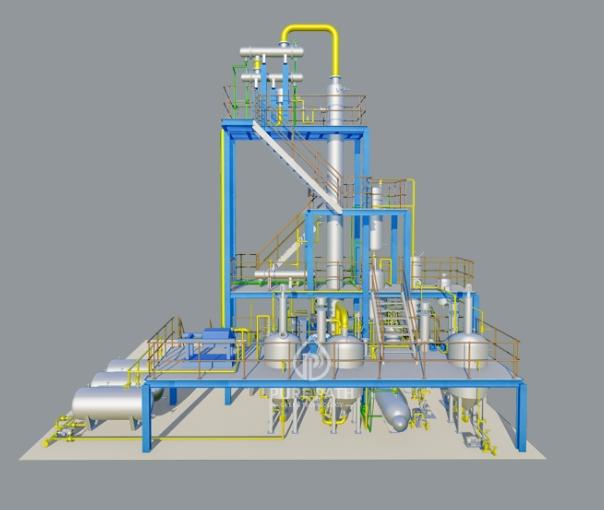The Role of Temperature Control in Solvent Extraction for Base Oil Production

Solvent extraction is a critical process in the production of high-quality base oil from waste oil. It involves using selective solvents to separate desirable lubricating oil fractions from impurities such as waxes, asphaltenes, and other contaminants. One of the most crucial factors influencing the efficiency and effectiveness of this process is temperature control. Proper temperature management ensures optimal solvent performance, maximizes yield, and maintains the quality of the base oil produced.
1. Optimizing Solvent Efficiency
The effectiveness of solvents in extracting base oil depends heavily on temperature. Each solvent has a specific temperature range where its selectivity and solubility are at their peak. For instance, common solvents like furfural or N-methyl-2-pyrrolidone (NMP) require precise temperature control to effectively dissolve the desired hydrocarbon fractions while leaving behind unwanted contaminants. If the temperature is too low, the solvent may not fully dissolve the target compounds, reducing extraction efficiency. Conversely, excessive temperatures can cause the solvent to dissolve impurities, compromising the purity of the base oil.
2. Preventing Thermal Degradation
Base oil is valued for its stability and performance characteristics, such as viscosity and oxidation resistance. Excessive temperatures during solvent extraction can lead to thermal degradation of the oil, breaking down its molecular structure and diminishing its quality. By maintaining optimal temperatures, operators can ensure that the base oil retains its desirable properties, meeting industry standards for use in lubricants and other applications.
3. Enhancing Separation and Recovery
Temperature control also plays a vital role in the separation and recovery of solvents from the extracted oil. After the extraction process, the solvent-oil mixture is typically heated to separate the solvent for reuse. Precise temperature control during this stage ensures efficient solvent recovery, reducing operational costs and minimizing solvent loss. Additionally, maintaining the correct temperature during the separation process prevents the formation of emulsions, which can complicate the recovery process and reduce overall efficiency.
4. Energy Efficiency and Cost Savings
Effective temperature control contributes to energy efficiency in solvent extraction plants. By operating within the optimal temperature range, the process requires less energy for heating and cooling, reducing operational costs. Advanced temperature control systems, such as automated heat exchangers and temperature sensors, further enhance energy efficiency by providing real-time adjustments and minimizing heat waste.
5. Ensuring Safety and Compliance
Temperature control is also critical for safety and regulatory compliance. Solvents used in extraction processes are often flammable or hazardous, and improper temperature management can lead to dangerous conditions, such as solvent vaporization or thermal runaway. Adhering to strict temperature guidelines ensures a safe working environment and compliance with environmental and safety regulations.
In conclusion, temperature control is a cornerstone of efficient and effective solvent extraction in base oil production. By optimizing solvent efficiency, preventing thermal degradation, enhancing separation, and ensuring safety, precise temperature management enables the production of high-quality base oil while maximizing operational efficiency and sustainability.
- Art
- Causes
- Crafts
- Dance
- Drinks
- Film
- Fitness
- Food
- Jogos
- Gardening
- Health
- Início
- Literature
- Music
- Networking
- Outro
- Party
- Religion
- Shopping
- Sports
- Theater
- Wellness


